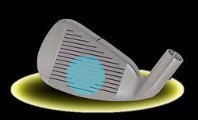
Forgiving Clubs: Improving Your Golf Game
Golf is a challenging sport that requires skill, precision, and practice. One aspect of the game that can greatly impact your performance is the type of golf clubs you use. Some clubs are designed to be more forgiving, meaning they are more forgiving of mishit shots and can help amateur golfers improve their game. Let's take a closer look at forgiving clubs and how they can benefit you on the golf course.
- What Are Forgiving Clubs?
- Features of Forgiving Clubs
- Larger Clubhead: Forgiving clubs often feature larger clubheads. This larger size creates a larger sweet spot, which is the area of the clubface that delivers the most consistent results. With a larger sweet spot, your mishits are more forgiving and can still result in decent shots.
- Perimeter Weighting: Forgiving clubs often have perimeter weighting technology. This means that the weight is distributed around the clubhead's perimeter, which helps to stabilize the clubhead throughout the swing and at impact. The perimeter weighting helps to resist twisting and provides more forgiveness on off-center hits.
- Low Center of Gravity: Forgiving clubs have a lower center of gravity compared to traditional clubs. This design element helps to launch the ball higher into the air and reduce the chance of hitting shots too low. A higher ball flight can be beneficial, especially for amateur golfers looking to improve distance and accuracy.
- Benefits of Forgiving Clubs
- Fewer Mishits: The larger sweet spot and perimeter weighting of forgiving clubs result in fewer mishits. This means that even if you don't strike the ball perfectly, you can still achieve decent results. Mishits with forgiving clubs tend to travel straighter and longer compared to mishits with other clubs.
- Increased Distance: Forgiving clubs are designed to enable golfers to hit the ball farther. The combination of a larger sweet spot, perimeter weighting, and low center of gravity helps to maximize the energy transfer from the clubhead to the ball, resulting in increased distance on shots.
- Improved Accuracy: The forgiveness offered by these clubs helps golfers hit the ball more accurately. The minimized effect of mishits means shots are more likely to land closer to the intended target. This can help improve your scores and overall game.
- Conclusion
Forgiving clubs, also known as game-improvement clubs, are designed with features that minimize the negative effects of mishits. These clubs are primarily aimed at golfers who have a higher handicap or struggle with consistency in their shots. The design elements of forgiving clubs help increase forgiveness to provide better results even when the ball is not struck perfectly.
Forgiving clubs typically have the following features:
Using forgiving clubs can offer several benefits for amateur golfers:
In summary, forgiving clubs are specifically designed to help amateur golfers improve their game by minimizing the negative effect of mishits. The larger clubhead, perimeter weighting, and low center of gravity work together to create a more forgiving club that provides more consistent results, increased distance, and improved accuracy for golfers. Consider investing in forgiving clubs if you are looking to take your game to the next level.





